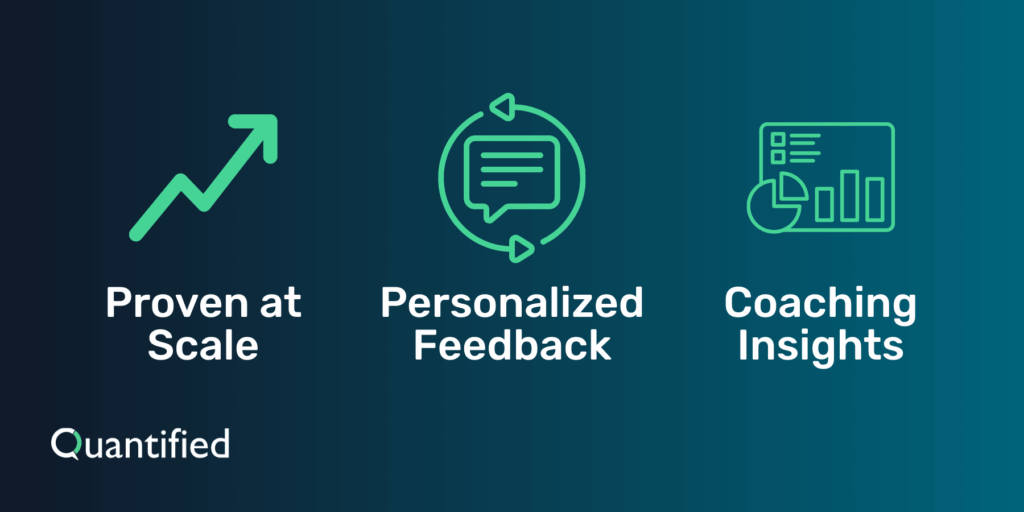At LTEN a few weeks ago, I attended a panel called “Beyond the Rep: Shaping the Next Generation of Pharma and MedTech Engagement.” Senior executives from Sanofi, Johnson & Johnson, GE Healthcare, BridgeBio, and AbbVie shared their perspectives on the changes shaping the industry.
They shared vision, frameworks, and wisdom—far too much to capture here. But a few points stood out, and these were my takeaways.
1. Soft skills are a hard requirement—and must be measured.
Reps aren’t just messengers anymore. They’re decision-support partners, quarterbacks, and problem solvers. With tighter HCP access and tougher competition, the bar for field performance is rising fast—and soft skills matter just as much as scientific knowledge.
Reps must know the content and know how to listen, adjust, and lead the conversation. And leaders must be able to assess those skills in training, rather than just using a rubric as a checklist.
2. Coaching is the linchpin.
Sanofi’s Jessie Lee nailed it: if reps are the players, managers are the coaches. The best field learning programs today aren’t just about training reps—they’re about coaching the coaches. That means clear measurement, ongoing reinforcement, and equipping managers with tools and insights they can actually use.
We heard about 30/60/90-day check-ins post-training, real-time performance tracking, and using coaching frameworks to identify rep attitude and aptitude. More organizations are asking: is this rep ready to level up, shift roles, or shift out of the organization?
3. One-off workshops aren’t cutting it.
The old playbook of “drop a workshop, hope it sticks” is fading. Leaders are focused on building personalized, continuous learning journeys—ones that fit into the flow of work and evolve over time.
This shift also demands that L&D gets to the table earlier. Instead of being the fix-it crew after a gap is found, they’re now being pulled in as strategic partners from the start. This is a tremendous opportunity for trainers and executives with the courage, conviction, and chops to step up and lead.
4. AI isn’t the topic—it’s the infrastructure.
There was talk of AI, but not in the way most would expect. No hype. No fear. Just a shared understanding that AI is now part of the operating system. Use cases focused on predictive analytics—what does this physician care about today?—and how to help reps act on that insight.
By 2030, someone said, “We won’t even be talking about AI.” Because we’ll just be using it. Quietly. Everywhere.
5. Data is the new coaching currency.
Several panelists spoke about the need for better insight into rep performance—not just after launch, but continuously. That means shifting from anecdotal manager feedback to objective, repeatable measurement. Reps need to know how they’re doing, not just that they finished training. And managers need real data to coach better, not just more. Tools that generate signal—not noise—are essential here.
6. Peer learning is rising.
It wasn’t just top-down training that got airtime. There was real emphasis on peer-to-peer learning: reps learning from each other’s best moments, not just trainer-built scenarios. With pressure on L&D teams to scale without increasing headcount, this kind of knowledge-sharing is both practical and powerful. But it only works if you can capture and surface high-quality examples consistently.
7. Personalized learning isn’t a luxury—it’s the new standard.
When reps are expected to sell across indications, specialties, or new products every quarter, generic training doesn’t cut it. Leaders want adaptive learning journeys tied to each rep’s role, performance gaps, and timing. Not everyone needs the same module on objection handling. Not everyone is ready for advanced pull-through conversations. The future is contextual, continuous, and custom.
Where We Fit In
The takeaway from this panel was clear: upskilling matters more than ever. But it’s only possible if we get better at coaching, at measuring, and at giving people tools that fit the way they actually work. That’s where Quantified can help.
Request a demo to learn how.
